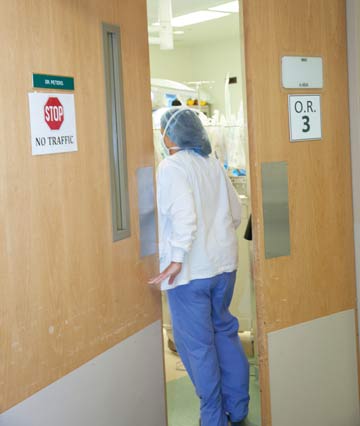One positive that's come out of the COVID-19 pandemic is a renewed focus on proper infection control practices. Facilities everywhere are ramping up their protocols and looking to cutting-edge technologies to help eradicate or prevent surgical site infections. Forward-thinking infection preventionists are also finding novel ways to use this technology specifically to combat COVID-19. Yale New Haven (Conn.) Health is a prime example.
"Once we realized there may be a critical shortage of N95 respirators in the near future, we immediately thought of using our hydrogen peroxide technology to safely reprocess respirators," says Nancy Havill, MT (ASCP), MHA, CIC, infection prevention manager at Yale New Haven Health.
Airborne hydrogen peroxide in the form of a mist or vapor is typically delivered via specialized machines during terminal cleanings of ORs. The machines "fog" hydrogen peroxide vapor or mist into the air, which covers every surface in the enclosed space.
When the coronavirus pandemic struck and N95 masks were in short supply, Ms. Havill's team got to work and tested the effectiveness of hydrogen peroxide vapor as a reprocessing method for used masks. "We developed an experiment involving heavily contaminated N95 masks with three different types of aerosolized bacteriophages that would mimic a heavy viral load and that were also safe for humans to handle," says Ms. Havill. "When the process was over, we tried to recover live bacteriophages from the respirators, and we didn't recover any. Hydrogen peroxide completely reverts back to oxygen and water, so there are no harmful residues."
Yale New Haven's detailed N95 reprocessing system starts in a negative pressure room, so the facility doesn't contaminate any other clinical areas. Staff members who work in the room don full PPE. Contaminated masks are sorted and hung individually by paperclips on three-by-five-foot racks that hold up to 250 masks. The racks are wheeled into a room where a hydrogen peroxide machine sits ready for use. After the room is completely sealed off, the masks are treated with hydrogen peroxide mist for 25 to 30 minutes. The room is then degassed and aerated.
"We put a load stick on every bag of reprocessed masks that includes the date it was sterilized and the load it was in," says Ms. Havill.
"We keep track of every load in the event there was a need to recall any respirators." Yale New Haven Health has safely reprocessed more than 20,000 respirators, according to Ms. Havill.
.svg?sfvrsn=be606e78_3)


.svg?sfvrsn=56b2f850_5)